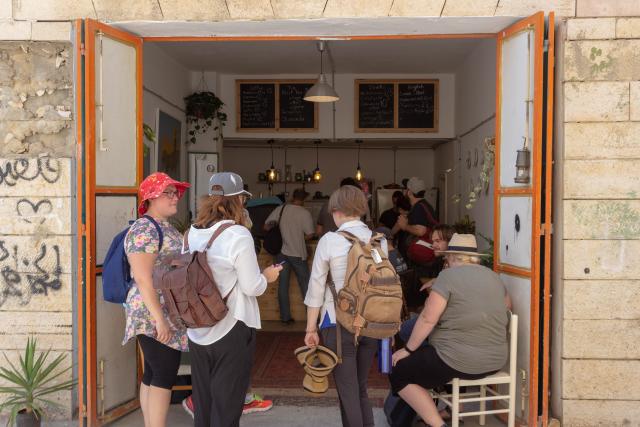Shanna Bernier shares the first of a series of Advent reflections, based on a young adult pilgrimage to Palestine and Israel.

In the winter of 2019 I felt a strong call to apply as a participant in a young adult trip to Palestine-Israel the following August. Thus began my pilgrim journey to the birthplace of Jesus and the heart of a land rights conflict, which has endured more than a century. Eleven young adults and two facilitators travelled to Bethlehem to connect with our Christian roots, to meet with United Church partners and to hear stories from Palestinians and Israelis about why this land is so sacred. It was a beautiful complex and difficult journey. We listened to stories and witnessed many tragic effects of the ongoing occupation. We also experienced moments of deep peace, overwhelming joy, unyielding hope, and passionate love.
As we travel along this Advent journey, I will share four reflections on the Advent themes, through the lens of my experience visiting the holy lands. My wish is for my reflections to inspire readers to explore the stories of Palestinian and Israeli people and to connect to the divine humanity in each story.
Hope
The season of Advent begins with hope. Hope for new birth. Hope for a better world. Hope for all the connections and magic that take place in darkest December. It is remarkable to me how much hope the Palestinian peoples can have, despite having lived for generations under military occupation. As a pilgrim in the holy lands, I heard many stories of pain, destruction, and loss. We met with Daoud Nassar, owner of Tent of Nations. He is a farmer, entrepreneur, and activist whose olive tree groves had been torn up and who was banned from building structures on his own land. Mr. Nassar and his team of workers feel daily pressure from the Israeli government to move away and give up. Despite this pressure, he remains filled with hope, inspiration, and persistence.
Walking through the hot, narrow streets of the Aida refugee camp in Bethlehem it was hard to see how internally displaced Palestinians, who have been refugees for generations, might continue to have hope. In the heart of this walled village was a small café, a recently opened enterprise. As we sipped our cool minty lemonade and shopped for hand-made jewellery and art made from shell casings and recycled tear-gas canisters, it is clear to see that resilience runs deep.
Our guide tells us about tragic events that have transpired in this place, about lives lost, and community projects destroyed by military occupiers. We ask him and others we meet about how they can remain hopeful for peace after so many years of conflict. We ask how our visit can possibly affect change. We hear a similar message each time: They are hopeful because they have no other choice and they are hopeful because we are here with them. They are hopeful because we are seeing what they live and they are hopeful we will tell their stories.
Mary had hope. Despite being afraid, despite living during a politically fraught time when the Jewish people were living under the military regime of the Roman Empire, Mary the Mother of Jesus had hope. She trusted in God, and she promised to do her best. We are still telling her story of hope thousands of years later.
— Shanna Bernier lives with her family in Sherbrooke QC and is Program Support Minister for Youth and Young adults in Nakonha:ka Regional Council. Her passions include children’s literature and making strawberry jam.
The views contained within these blogs are personal and do not necessarily reflect those of The United Church of Canada.